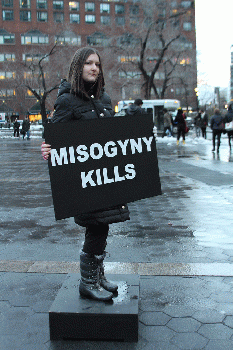Recently, a valued contributor to OpEdNews published an article entitled "The Hypocrisy of Religious People Regarding Women." In it, he argued that all "revealed" religions, Judaism, Christianity, Islam, Mormonism and Baha'? (sic) are guilty of promoting misogyny."
They are hypocritical regarding women, he wrote, because of the many "pathetic and damaging examples of misogyny in the Hebrew Bible."
In support of his argument, he referenced the Genesis story about the first man and first woman (Gen 1:26-27 and 2:21-23) and the interpretation of that story by the anonymous author of First Timothy. The latter took the myth to mean that women sinned first and therefore deserve punishment and subjection to men (1 Tim 2:11-14).
Moreover, the author alleged, the hypocrisy of religious people extends far beyond Judaism and Christianity to include Hinduism and Buddhism. Islam was highlighted as especially hypocritical since, he wrote, it encourages husbands to beat their disrespectful or disobedient wives.
To remedy such outrages, our friend called for the replacement biblical teachings with an American-and-Eurocentric Deism, especially as espoused by the Founding Fathers like Thomas Paine. The Founders, he inferred, were not only champions of women, but adopting their free thought and nonreligious approach to God would save humanity from the social evils hypocritically supported by "religious people."
In this brief essay, I'd like to respectfully disagree with my OEN colleague. Let me do so by (1) saying a word about hypocrisy, (2) showing the diversity of "religious people," who are not nearly all guilty of misogyny, and (3) suggesting that Deism as represented by our Founders (including Thomas Paine) is itself deeply embedded in extreme hypocrisy not only towards women, but towards indigenous and black people as well.
Hypocrisy's Meaning
Here I can be quite brief.
Hypocrisy does not mean "beliefs harmful to others" as my colleague seems to imply. Rather and relative to misogyny, it entails adopting an anti-woman course of action while knowing and even affirming that doing so is wrong. That's what hypocrisy means - lack of correspondence between one's professed convictions on the one hand and one's actions on the other.
This means that proving that all "religious people" are "hypocritical regarding women," would entail showing that what all of them believe and say about women is insincere. Alternatively, the author's use of the term hypocrisy might suggest that all "religious people" (or maybe just most of them?) mistreat women and hate them (that's what misogyny means) because of the believers' religious convictions.
Obviously, such assertions are untrue.
And that brings me to my second point which needs fuller explanation.
Religious Diversity
Here I must make two obvious points. The first is that all "religious people" cannot be tarred with the same brush. And besides, the beliefs of religious people about women and those "revealed texts" are also quite diverse.
That many believers might be hypocritical cannot be denied. However, it's difficult to identify just who falls into that category (as defined above). It's risky for anyone who can't read minds. Perhaps rather than identifying the beliefs of some as hypocritical, it would be better to call them uninformed, immature, or simplistic.
(Note: You can view every article as one long page if you sign up as an Advocate Member, or higher).






